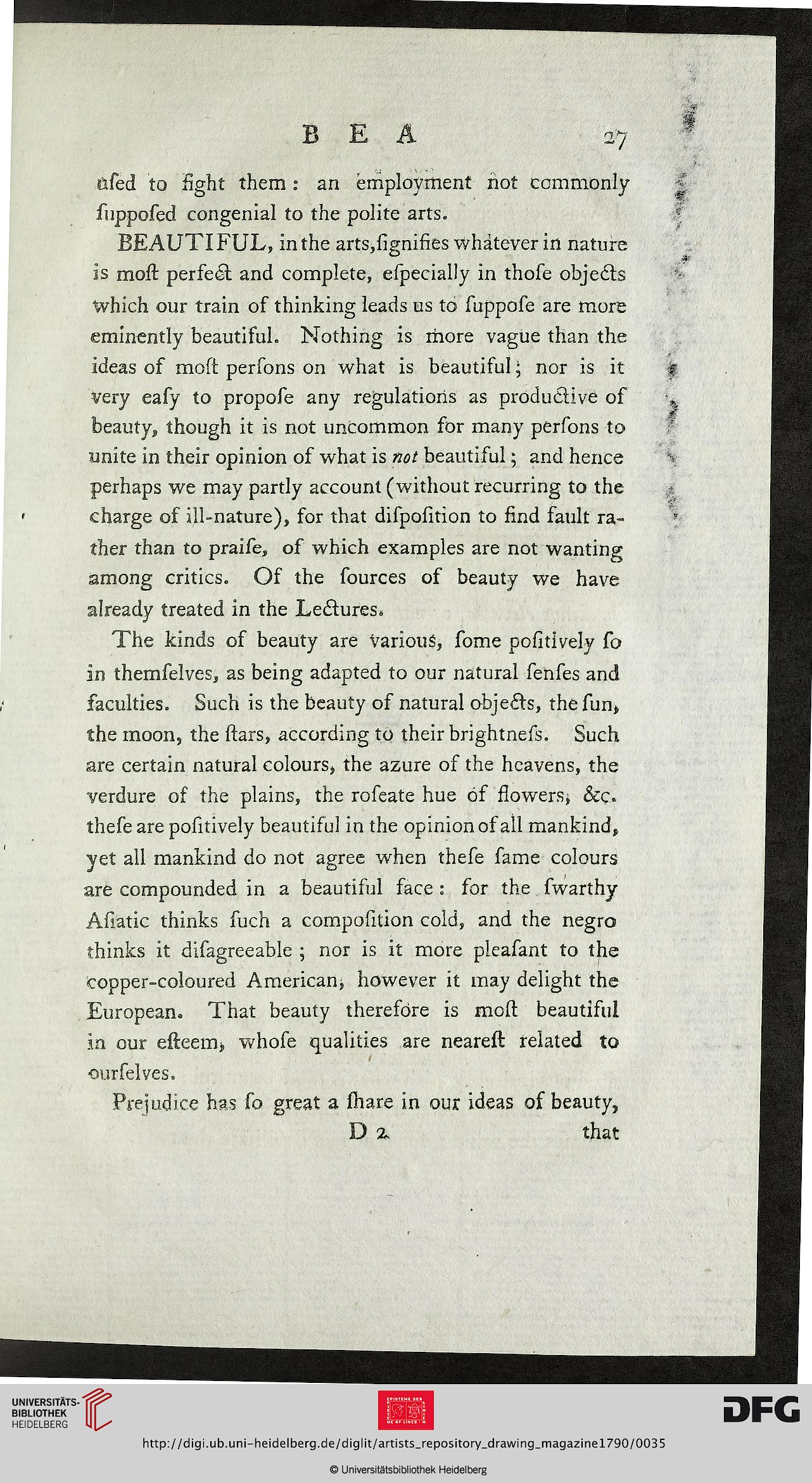B E A
nfed to fight them: an employment not commonly
fuppofed congenial to the polite arts.
BEAUTIFUL, in the arts,fignifies whatever in nature
is moft perfect and complete, efpecially in thofe objects
Which our train of thinking leads us to fuppofe are more
eminently beautiful. Nothing is more vague than the
ideas of moft perfons on what is beautiful; nor is it
very eafy to propofe any regulations as productive of
beauty, though it is not uncommon for many perfons to
unite in their opinion of what is not beautiful; and hence
perhaps we may partly account (without recurring to the
charge of ill-nature), for that difpofition to find fault ra-
ther than to praife, of which examples are not wanting
among critics. Of the fources of beauty we have
already treated in the Lectures*
The kinds of beauty are Various, fome pofitively fo
in themfelves, as being adapted to our natural fenfes and
faculties. Such is the beauty of natural objects, the fun,
the moon, the ftars, according to their brightnefs. Such
are certain natural colours, the azure of the heavens, the
verdure of the plains, the rofeate hue of flowers, &c.
thefe are pofitively beautiful in the opinion of all mankind,
yet all mankind do not agree when thefe fame colours
are compounded in a beautiful face : for the fwarthy
Afiatic thinks fuch a compofition cold, and the negro
thinks it difagreeable ; nor is it more pleafant to the
copper-coloured American, however it may delight the
European. That beauty therefore is moft beautiful
in our efteem> whofe qualities are neareft related to
ourfelves.
Prejudice has fo great a fhare in our ideas of beauty,
D % that
nfed to fight them: an employment not commonly
fuppofed congenial to the polite arts.
BEAUTIFUL, in the arts,fignifies whatever in nature
is moft perfect and complete, efpecially in thofe objects
Which our train of thinking leads us to fuppofe are more
eminently beautiful. Nothing is more vague than the
ideas of moft perfons on what is beautiful; nor is it
very eafy to propofe any regulations as productive of
beauty, though it is not uncommon for many perfons to
unite in their opinion of what is not beautiful; and hence
perhaps we may partly account (without recurring to the
charge of ill-nature), for that difpofition to find fault ra-
ther than to praife, of which examples are not wanting
among critics. Of the fources of beauty we have
already treated in the Lectures*
The kinds of beauty are Various, fome pofitively fo
in themfelves, as being adapted to our natural fenfes and
faculties. Such is the beauty of natural objects, the fun,
the moon, the ftars, according to their brightnefs. Such
are certain natural colours, the azure of the heavens, the
verdure of the plains, the rofeate hue of flowers, &c.
thefe are pofitively beautiful in the opinion of all mankind,
yet all mankind do not agree when thefe fame colours
are compounded in a beautiful face : for the fwarthy
Afiatic thinks fuch a compofition cold, and the negro
thinks it difagreeable ; nor is it more pleafant to the
copper-coloured American, however it may delight the
European. That beauty therefore is moft beautiful
in our efteem> whofe qualities are neareft related to
ourfelves.
Prejudice has fo great a fhare in our ideas of beauty,
D % that




